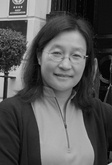Mei Xueqin was a Carson Fellow from June 2013 to August 2013 and from July 2014 to September 2014.
Mei Xueqin is a historian of modern world history at Tsinghua University. Her research interests are nineteenth- and twentieth-century history, with a particular interest in British industrialization and urbanization and their impacts on the environment within Britain and abroad. Investigating both the ways that modern British people incorporated nature and the environment into their productive fields and their everyday lives, and the problems and solutions encountered during this process, Mei tries to discover the lessons that contemporary countries such as China could learn from British history of modernization. Before coming to Tsinghua University, she taught at Beijing Normal University, having received a PhD from Nanjing University in 1994. At the Rachel Carson Center for Environment and Society, she will be working on a history of the pollution and restoration of the Thames River and its significance for contemporary China.
RCC Research Project: “Dirty Father Thames”: The Pollution and Restoration of the Thames River, 1840s–1980s (pdf, 15 KB)
Film Interview with Mei Xueqin
Selected Publications
- Discussing and Narrating Environmental History Studies. Beijing: China Environmental Science Press, 2011.
- “From the History of the Environment to Environmental History: A Comprehension of Environmental History Studies,” Academic Research 262, no. 9 (2006).
- On Environmental History and Environmental Problems. Beijing: People’s Press, 2004.
- “Robert Angus Smith: A Case Study on Scientists and the Control of Industrial Pollution in 19 Century in Britain,” Journal of LiaoNing Normal University (Social Science Edition) 146, no. 6 (2002).
- “Research on Air Pollution of Britain’s Cities and their Measurements of Control Recent Hundred Years,” Journal of Beijing Normal University (Humanities and Social Science) 164, no. 2 (2001).


